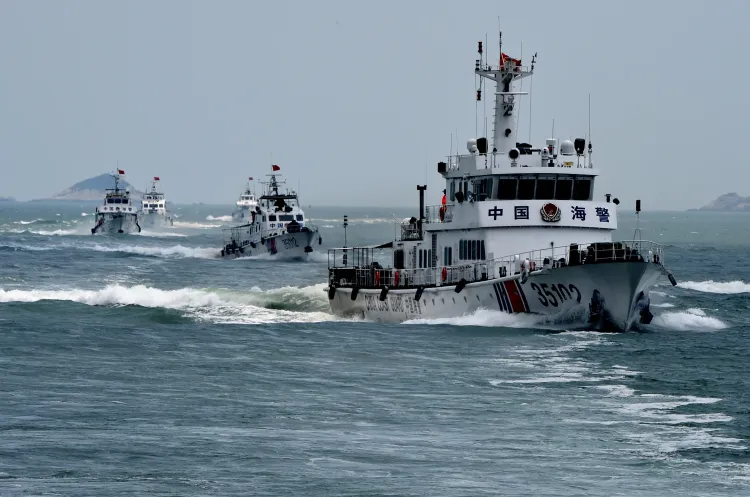Why Did China Block a South Korean Survey Ship Near West Sea Structures?

Synopsis
Key Takeaways
- Chinese vessels obstructed a South Korean ship in the Yellow Sea.
- The incident highlights ongoing maritime tensions in the PMZ.
- It marks the second standoff in less than a year.
- China's actions are viewed as violations of UNCLOS.
- South Korea asserts the legitimacy of its research operations.
Seoul, Oct 28 (NationPress) Chinese Coast Guard vessels obstructed a South Korean research ship last month in a contested maritime zone of the Yellow Sea while it was conducting inspections on structures built by China, leading to a tense standoff, according to a report from a US think tank.
The details emerged from a report titled 'Korea-China Standoff in the Provisional Measure Zone (PMZ),' released by the Washington-based Centre for Strategic and International Studies (CSIS), as reported by Yonhap News Agency.
Referring to data from maritime analytics company Starboard Maritime Intelligence, CSIS reported that the South Korean research vessel Onnuri entered the Provisional Maritime Zone (PMZ)—an overlapping sea zone between the two nations—on September 24 to inspect steel structures placed by China.
Approximately six hours after entering the zone, a Chinese coast guard vessel approached the Onnuri, followed by two additional ships from a port in Qingdao. In response, a South Korean coast guard vessel was dispatched to the area for support.
The next day, the Onnuri and the South Korean coast guard ship advanced towards two Chinese aquaculture structures, designated as Shenlan No. 1 and Shenlan No. 2, located within the PMZ. As the Onnuri sought to inspect these facilities, two Chinese coast guard vessels flanked it on either side.
For about 15 hours, the Chinese vessels followed the Korean ships, only departing when they exited the PMZ.
This incident marked the second standoff in just seven months, following a similar occurrence in February.
CSIS emphasized that this latest event illustrates China's ongoing pattern of asserting its presence and maintaining surveillance over maritime structures it has unilaterally established in disputed waters.
The think tank asserted that Beijing's attempts to limit the movement of South Korean vessels within the PMZ are in clear violation of the United Nations Convention on the Law of the Sea (UNCLOS), which ensures freedom of navigation for all foreign ships in exclusive economic zones (EEZs).
While South Korea maintains that the inspection conducted by the Onnuri was legitimate, China has labeled the facilities as aquaculture farms and has insisted that the Korean vessel vacate the zone.
During a parliamentary audit session on Tuesday, South Korea's Foreign Minister Cho Hyun stated, 'The United States is taking this matter seriously,' in reference to the standoff's proximity to the US military base in Pyeongtaek, located 74 kilometers southwest of Seoul.
'The government will assess how to collaborate with Washington on this issue based on future developments in the region,' he added.









